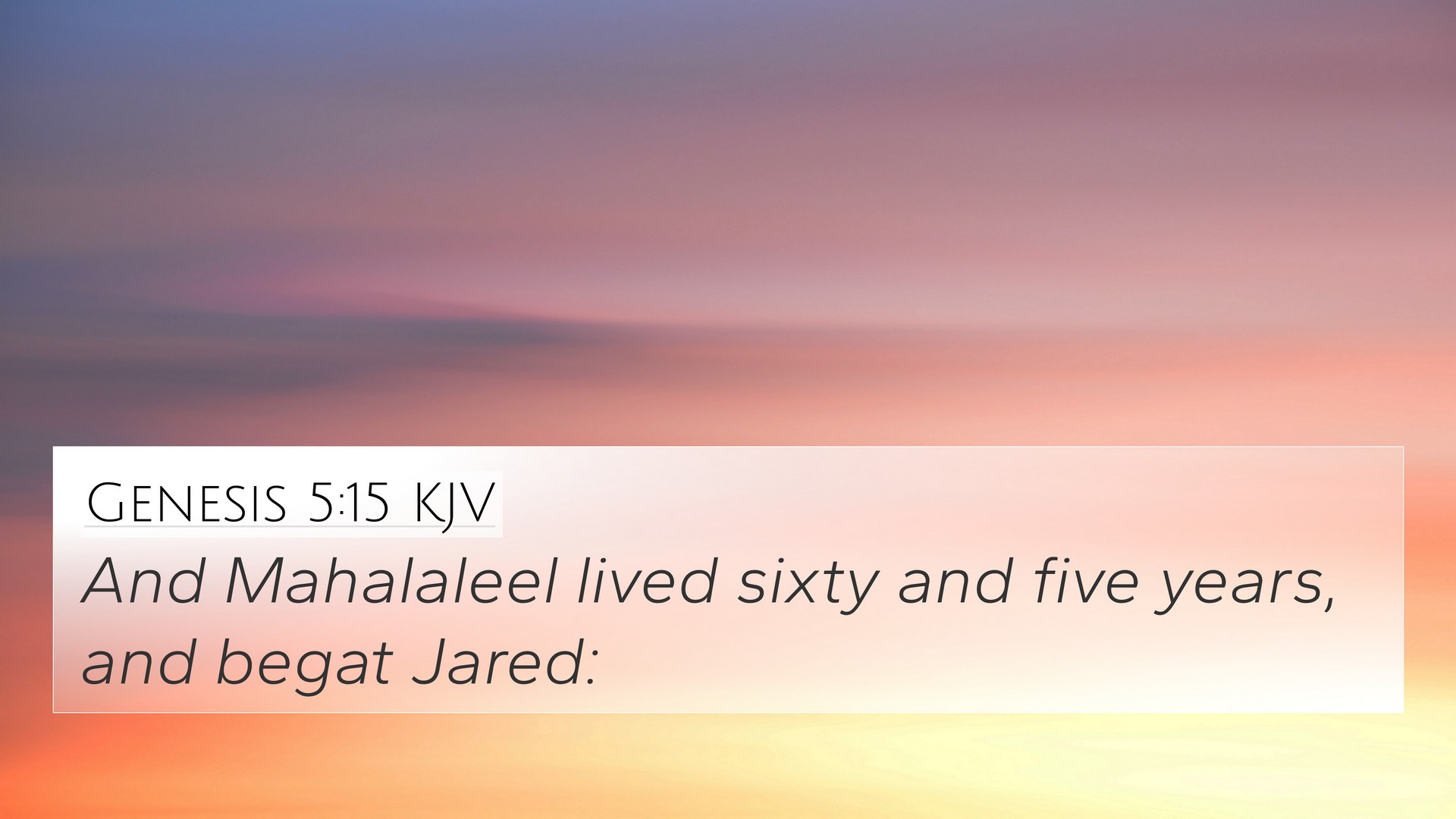Understanding Genesis 5:15
Genesis 5:15 states: "And Mahalalel lived sixty and five years, and begat Jared." This verse presents genealogical information concerning the lineage from Adam to Noah, emphasizing the continuity of human generations. The name Mahalalel means "praise of God," a reflection of faith even in names during the antediluvian period.
Meaning and Significance
This passage succinctly contributes to the overarching theme of God's sovereignty and promise of preservation through generations. The genealogy serves both historical and theological purposes, detailing how God'd plan unfolds through human history.
Key Insights from Commentaries
-
Matthew Henry: Henry emphasizes the significance of genealogies in showing God's unbroken chain of promises from one generation to the next. Mahalalel, as a transitional link, illustrates how God continues to work through family lines, culminating in the ultimate fulfillment of divine promises.
-
Albert Barnes: Barnes notes that the age at which Mahalalel begat Jared signifies a period of preparation and development. He often remarks on the importance of these names in understanding the spiritual condition and cultivation of the Earth, suggesting an era of noteworthy character development that leads to the Covenant.
-
Adam Clarke: Clarke elaborates that the names in this genealogy hold deeper meanings, encapsulating attributes of God. Mahalalel's faith expressed through his name is a point of connectivity to the dependency on God for existence and survival, revealing underlying theological principles indicative of divine relationship with humanity.
Connections with Other Bible Verses
This verse can be seen as a link in the broader narrative of Scripture, showcasing the importance of connections between Bible verses.
- 1 Chronicles 1:2 - This verse provides a broader genealogical context, illustrating continuity from Adam to the patriarchs.
- Luke 3:37-38 - In the genealogy of Jesus, Mahalalel is specifically mentioned, symbolically emphasizing Christ's links to humanity.
- Hebrews 7:14 - This reference underscores Jesus' line coming from Judah, but shows the importance of understanding previous figures within the lineage including Mahalalel.
- Romans 5:12 - The importance of Adam's lineage is stressed here, linking back to Genesis to show the consequence of sin through generations.
- Matthew 1:1 - The genealogy of Christ references the importance of these ancestral lines culminating in the Messiah.
- Genesis 10:25 - It shows the descendance of nations and peoples, affirming God's sovereign distribution of sprightly progeny.
- Ephesians 3:15 - Indicates how families reflect God’s dwelling place, tying back to the familial lines in Genesis.
Thematic Connections
Thematically, Genesis 5:15 alludes to the concept of legacy, the passage of faith through generations, and God's consistent engagement with humanity.
- Faith and Legacy: Each name in the genealogy builds on the faith of the previous generations, revealing God's covenantal faithfulness.
- Divine Sovereignty: This continuous line showcases God’s control in human history, supporting the need for comparative Bible verse analysis in understanding divine intention.
- Covenantal Promise: Each generation advances the promise of redemption, illustrating God's long-term plans throughout Scripture.
Helpful Tools for Bible Cross-Referencing
For scholars interested in deeper exploration, various tools and methods can enhance understanding:
- Utilizing a Bible concordance to locate similar key terms and themes across texts.
- Employing a Bible cross-reference guide to find thematic connections.
- Incorporating a comprehensive Bible cross-reference system to enrich personal study and understanding.
Conclusion
Genesis 5:15 is not merely a genealogical entry; it holds layers of meaning tied to faith, legacy, and the unfolding plan of God. As one traces these connections, insights into God's character and faithfulness emerge, encouraging believers to reflect on their own spiritual heritage.



